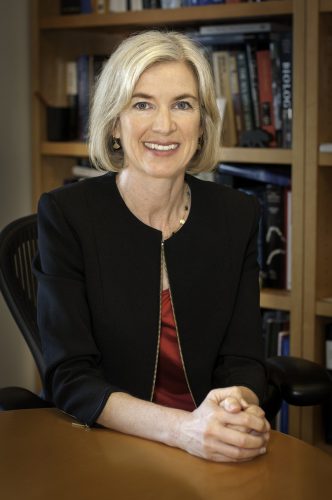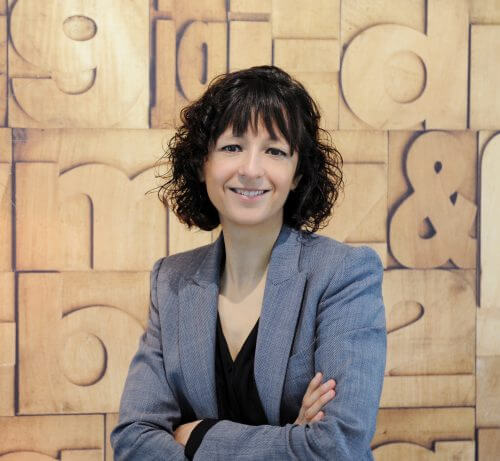Through the groundbreaking findings, the scientists laid the foundation for an innovative technological development of diverse and specific editing and engineering of the genome

The Wolf Prize in Medicine is awarded to Professor Jennifer Doudna for revealing the mechanism expected to revolutionize the world of medicine, of bacterial immunity through RNA-guided editing of the genome and to Emmanuel Charpentier for deciphering and redirecting the CRISPR/Cas9 bacterial immune system to edit the genome.
Jennifer Dowdana grew up in rural Hawaii, where she first became interested in the chemistry of living systems. Dr. Dowdana currently serves as the Governor of the Li Ka-shing Center for Health and Biomedical Sciences and is a professor of molecular and cellular biology and professor of chemistry at the University of California, Berkeley and a researcher at the Howard Hughes Medical Institute. Dowdana is a member of the National Academy of Sciences, the American Academy of Arts and Sciences, the National Academy of Medicine and the American National Academy of Inventors.
Daudena's research tries to understand how RNA molecules control the expression of genetic information. Early in her career, Dr. Doudna's group determined some of the first crystal structures of RNA and RNA-protein complexes and provided unprecedented insights into the molecular function of non-protein-coding RNA.
Together with Prof. Emmanuel Charpentier, the two led the discovery of the revolutionary gene editing tool known as CRISPR. With these groundbreaking findings, the scientists laid the foundation for an innovative technological development of diverse and specific editing and engineering of the genome. With the help of this revolutionary technology of "genetic scissors" it is possible to "turn on" a gene or "turn it off", change, repair or remove genes. This new tool is currently used in molecular biology laboratories around the world, and has the potential to pave the way for finding new forms of treatment for incurable diseases. This technology leads a revolution in the fields of genetics, molecular biology and medicine.

Emmanuelle Charpentier is a French biochemist, microbiologist and geneticist known as a leading expert in the world on control mechanisms underlying infection and immunity processes in bacterial pathogens. Together with Prof. Jennifer Dowdana, the two led the discovery of the revolutionary gene editing tool known as CRISPR-Cas9. With these groundbreaking findings, the scientists laid the foundation for an innovative technological development of diverse and specific editing and engineering of the genome. With the help of this revolutionary technology of "genetic scissors" it is possible to "turn on" a gene or "turn it off", change, repair or remove genes. This new tool is currently used in molecular biology laboratories around the world, and has the potential to pave the way for finding new forms of treatment for incurable diseases.

The Wolf Prize in Medicine is awarded to Dr. Jennifer Doudna for her continued excellence in research, which led to her groundbreaking work and systematically revealed, in collaboration with Prof. Emmanuel Charpentier, both the structural components and the mechanism of bacterial immunity against viruses through genome editing, a development expected to bring about a revolution in medicine; And also thanks to its important contribution to the ethical debate on how this technology should be used to ensure its successful and at the same time humane and considerate application to improve human health and well-being.
Charpentier studied biochemistry, microbiology and genetics at the Pierre and Marie Curie University in Paris, France. She received her doctorate in microbiology at the Pasteur Institute in France. Charpentier then continued her work in the United States, at Rockefeller University, NYU London Medical Center, the Skirball Institute for Biomolecular Medicine (all in New York) and St. Jude Children's Research Hospital in Tennessee. Charpentier returned to Europe to establish her own research group as an adjunct professor and associate professor in the laboratories of Max Perutz at the University of Vienna in Austria. She was then appointed a professor at Umma University in Sweden, where she researched in the field of medical microbiology and was active as a visiting professor until 2017. Between 2013 and 2015, she served as the head of the Department of Regulation in Infectious Biology at the Helmholtz Center for Infection Research, Braunschweig, and a professor at the Hannover Medical School in Germany. In 2013 she was awarded a professorship at Alexander von Humboldt. In 2015, Charpentier was appointed as a scientific member of the Max Planck Society. From 2015 to 2018, she served as the director of the Department of Regulation in Infectious Biology at the Max Planck Institute for Infectious Biology in Berlin, Germany. Since 2018, Charpentier has been a researcher and director of the Max Planck Institute for Pathogens, an institute she founded together with the Max Planck Society.
The bacterial CRISPR-Cas9 system is based on a vaccine-like protective action mechanism that bacteria use to protect themselves from viruses. This mechanism of action was discovered by Emmanuel Charpentier in collaboration with Jennifer Daudena. The genome editing technique developed as a result of the scientists' findings allowed the researchers to immediately focus on the DNA and cut it with great precision. Thanks to this, the speed, efficiency and flexibility of genome editing have improved and become unprecedentedly quick and easy. Already today, this new understanding allows researchers all over the world to quickly produce in the laboratory models of genes that cause diseases in humans, in order to accelerate research into new drug candidates, and to develop new directions for the treatment of genetic disorders in humans. These very characteristics also require extreme caution in the use of this innovative technology, emphasizing the need for constant exchange of information between research scientists and policy makers in order to avoid the risks associated with the irresponsible use of these unprecedented research tools.
This discovery revolutionizes life science research and opens up completely new opportunities in biomedical gene therapy and others that affect society and humanity. The field of CRISPR-Cas9 continues to develop rapidly into a set of tools for the study of cellular and molecular biology thanks to the simplicity, high efficiency and flexibility of the system and new and exciting developments are born almost every week.
The Wolf Prize in Medicine is awarded to Prof. Emmanuel Charpentier for applying her expertise in bacterial pathogens to deciphering the CRISPR/Cas9 bacterial immune system and redirecting its role in protection against pathogens and to developing genome editing that allows the use of all living organisms on Earth.
More of the topic in Hayadan:
The US Department of Agriculture has removed restrictions on the development of genetically modified plants
The off switch for genetically modified organisms
"We researched how the yogurt bacterium protects itself against viruses, we did not plan in advance to develop a gene editing system"

3 תגובות
Gene therapy of incurable diseases (lack of beta acid lipase enzyme)
Those involved in this field are doing a great mitzvah of medical mission and saving lives and they will also get rich, honor, publicity and the like..
Cheers! A lot of success !
a question.
This Wolf Prize I understood to be an Israeli prize.
Is this prize considered prestigious?
Is anyone interested in him at all or is it only written about in the Israeli press?
Whoever won it is considered for him or is it an esoteric detail that some country in the Middle East gave him a prize.
I will be happy to answer
This is about discovery and not development.